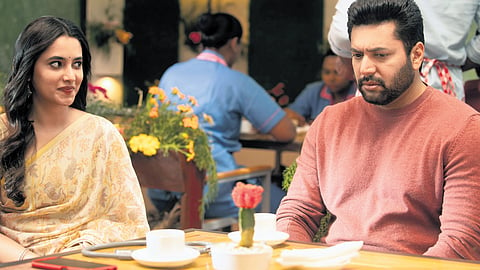

Having worked with directors Ameer and SA Chandrasekhar, who are known for their dramas with socially relevant elements, director M Rajesh branched out to make comedy hits like Siva Manasula Sakthi (SMS), Boss Engira Baskaran, and Oru Kal Oru Kannadi (OKOK).
Despite his recent rough patch, he determinedly says he will stay on course to explore more on the relationship and family end in the coming years, and his recent film Brother with Jayam Ravi and Priyanka Mohan is a step in that direction.
Explaining why he chose comedy after collaborating with serious filmmakers like SAC and Ameer, he tells us neither he chose the genre at first nor the filmmakers. “I came to Chennai to be a part of films. I did not think beyond that. Back then, you couldn’t choose your mentor according to the kind of films you wanted to make. I worked as an assistant for Ameer sir and SAC sir by chance, not choice. It turned out to be a great learning experience and a blessing for me.”
Adding how the experience is still of great help, he says, “SAC sir maintains a strict military discipline at sets. I think he is the only director who begins filming at the exact time he says he will. No wonder why directors who worked with Vijay sir appreciate his punctuality. I am still trying to bring such discipline to my sets. Also, I am still a student learning to master perfectionism from Ameer sir.”
On why he still chooses to stick to comedy when the genre hasn’t been paying him rich dividends in recent times, he says, “I don’t attribute the failure to the genre, but rather to the way I handled scripts. Take Mr Local, for instance. Instead of coming up with something new that would suit Sivakarthikeyan, I made the film look like an extension of SMS where an egotistic hero and heroine fight. Looking back, I regret not utilising Siva to the fullest. I have learnt not to repeat a kind of screenplay again and again. Instead of borrowing things from my previous successful films, now I want to create a fresh world with fresh characters for every film. Even Brother is such a film where I have tried my hand at intricate emotions in addition to comedy.”
When asked to elaborate on Jayam Ravi’s statement about editing a family drama being the trickiest thing, Rajesh says, “That is because films of this genre will have multiple characters emoting to a particular situation, an editor needs to be sensible enough to determine a shot’s length and whose expressions require emphasis. My editor Ashish had to run Brother’s story in his mind when editing each and every scene.” He goes on to add that Brother carried clean humour and had several serious situations that necessitated meticulous editing.
Having gained notoriety over employing certain problematic tropes for comedy scenes, Rajesh reveals that he has turned a leaf with regard to humour. “I took cognisance of my comedy scenes not being regarded as funny anymore. I sincerely regret having thought of body shaming and mocking religious beliefs as a way of evoking laughter. In the future, my focus will be on creating healthy humour,” he explains.
He goes on to add, “Not just humour; I have to tweak my writing style for romance too. People criticised me for glorifying Siva and Sakthi’s toxic traits as love upon SMS’s re-release. I didn’t intend to glorify toxic romance; what I showed in the film 15 years ago was not understood as problematic. I don’t subscribe to calling each and every misunderstanding between couples toxic, but yeah, I have set a mental parameter now. I understood where to limit the toxic traits to not make it look toxic. So my SMS 2 script will be written factoring in all these considerations and political correctness. I have already started writing this way with Brother; that’s the reason why I got a clean U certificate without cuts.”
On uniting with Harris Jayaraj after nearly 14 years, he says, “It feels great to be back with Harris sir. He has always been updating his music with time, which has made me comfortable. It was a breeze to get songs and scores for the film. I only had to tell him the situation and nothing more. When I told him I wanted an unconventional hero introduction song, he gave me a chartbuster like ‘Makkamishi’ with Paal Dabba. The number was not just catchy; it also acted as the hero’s character description and imparted a timely social message. It is the same with the background score as well; he hit the right notes in all the emotional scenes without me explaining much.”
Talking about why he chose Brother as the film to return to the silver screen after Mr Local, Rajesh says, “I was intrigued by the idea of combining the worlds of Boss Engira Baskaran and Santhosh Subramaniam. The families shown in both films are polar opposites. I let the idea of placing a son like Baskaran with a father like Subramaniam simmer for some time. It felt interesting, and then Brother happened. The film is a first step for me to venture out into the emotional spaces in a family. My future projects will not just rely on humour but will also deal with emotions.”